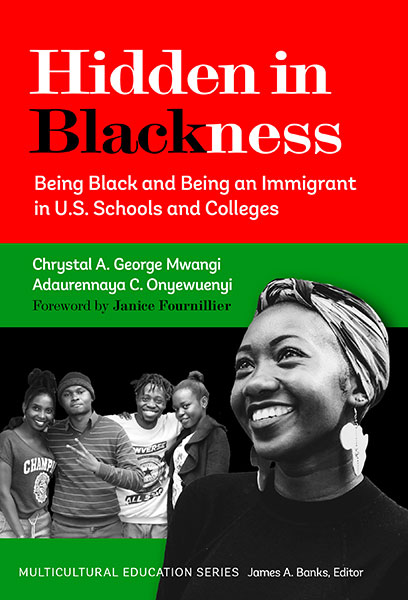Professors: Request an Exam Copy
Print copies available for US orders only. For orders outside the US, see our international distributors.
Chrystal A. George Mwangi, Adaurennaya C. Onyewuenyi
Foreword by: Janice B. Fournillier
Publication Date: February 28, 2025
Pages: 224
Series: Multicultural Education Series

This timely book offers a transdisciplinary approach for understanding and improving the educational experiences of Black immigrants.
Hidden in Blackness analyzes the experiences, perspectives, and development of Black immigrant students, while also complicating how race, ethnicity, nativity, and nationality are understood across the P–20 education landscape.
The authors unpack how Blackness and anti-Black racism in the United States can foster Black immigrants becoming hidden in Blackness in schools and education research—meaning their Black identity is homogenized into a U.S. construction of Blackness while their ethnicity, nationality, and nativity go unacknowledged or is weaponized to subjugate other people of Color. The book culminates by offering the Black Diasporic Illumination (BDI) framework with recommendations for supporting these students with a positive sense of self and abilities in the face of racial realities. BDI bridges sociocultural ecology, ethnic-racial identity and socialization scholarship, asset orientations, and critical constructions of race and racism into a transdisciplinary approach for understanding the experiences of Black immigrants in U.S. education.
Book Features:
Chrystal A. George Mwangi, a transnational Black women scholar, is an associate professor of higher education at George Mason University. Adaurennaya “Ada” C. Onyewuenyi, a second-generation Nigerian of the Igbo tribe, is an associate professor of psychology and affiliate faculty of African American studies at The College of New Jersey.
"At a time when the importance of diversity, equity, and inclusion and social justice are being debated, this book strikes at the heart of how these issues are both present and absent in the research narratives related to Black immigrant students. It addresses the challenges of using constructs and theories that often do not represent their educational experiences. By recommending alternative, non-U.S.-centric theories and models, (the authors) make an invaluable and much-appreciated contribution to the body of knowledge on Black immigrant students across the U.S. Pre-K–20 education system."
—From the Foreword by Janice B. Fournillier, professor, Georgia State University
“This deeply researched, student-centered volume fills a critical gap in the field and equips scholars and practitioners with essential insights for better seeing and serving the rich diversity of the Black immigrant student population from K–12 through college. A groundbreaking contribution!”
—Carola Suárez-Orozco, professor in residence, Harvard Graduate School of Education
“Hidden in Blackness highlights the unique, often-overlooked experiences of Black immigrant students in the American education system, challenging educators to see beyond the monolithic views of Blackness and consider the intersections of Black immigrant identities. George Mwangi and Onyewuenyi present these students’ stories with depth and insight, making this work crucial for educators, researchers, and policymakers committed to understanding diversity in education.”
—Mercy Agyepong, assistant professor of sociology of education, NYU Steinhardt
“Hidden in Blackness offers a richly researched, historical, and contemporary portrait of the diversity and intersectionality of immigration and Black experiences in the U.S. education system. Destabilizing tired binaries and divisions fabricated by white supremacy, George Mwangi and Onyewuenyi introduce a necessary both/and narrative that can hold the dynamic, complex realities of human experience. Hidden in Blackness makes a profound contribution to the study and practice of human development—and the lives of people racialized as Black in the United States."
—Leoandra Onnie Rogers, associate professor of comparative human development, The University of Chicago
Contents
Series Foreword James A. Banks xi
Foreword: What Do You Know About and How Do You Study “Black and Immigrant Students”? Janice B. Fournillier xv
Acknowledgments xix
Introduction: Complicating Blackness and Immigration 1
Hidden in Blackness 1
Black Immigration Flows and Immigration Policies 2
Black Immigrant Demographic Shifts in the United States 6
How We Enter: Author Positionalities 9
Organization of the Book 13
1. Lifting the Veil on the Landscape of Black Immigrant and U.S. Education Scholarship 14
The Research Landscape 14
Reframing Black Immigrants’ U.S. Educational Experiences 18
Conclusion 21
2. Complicating Racial Identity Development 22
Black Identity Development Theories 22
Black Immigrants and Black Identity Development 26
Linking Blackness and Nativity, Ethnicity, and Nationality 31
Centering Power in Understanding Black Immigrants’ Racial Identity Development 38
3. Complicating the K–12 Education System and Structures 40
School Environment 41
Family vs. School or Family and School? 54
Conclusion 56
4. Complicating K–12 Social Support and Resources: Black Immigrant Youth Navigating Gatekeepers and Shepherds 57
Gatekeepers and Shepherds 58
Family and Community Expectations, Socialization, and Support 58
Peers as Facilitators, Supporters, or Prohibitors 67
Teachers and School Counselors as Interrupters, Advocates, or Instigators 75
Black Immigrant Students’ Strategies to Navigate Various Environments and Relationships 80
Conclusion 82
5. Complicating Access to Higher Education 83
Framing the College-Going Process 84
College-Going Motivators, Supports, and Resources 85
Barriers to the College-Going Process 94
Conclusion 100
6. Complicating Student Experiences in Higher Education 101
Adjustment to College 101
Experiences With Campus Culture and Climate for Diversity 104
Classroom and Academic Experiences 109
Social and Peer Engagement 112
Conclusion 120
7. Complicating Education and Workforce Outcomes 121
Educational Outcomes: Complicating the Success Story 121
Workforce Participation and Outcomes 125
Conclusion: Hidden No More: The Black Diasporic Illumination Framework 131
Developing the BDI Framework: Theoretical and Conceptual Grounding 131
BDI Framework 133
Implications for Future Research 136
Implications for Education Practice and Policy 138
Conclusion 140
Epilogue: A Love Letter to Black Immigrant Students Navigating the U.S. Education System 142
Appendix: Data Sources and Research Designs 145
Endnotes 155
References 157
Index 193
About the Authors 201
Professors: Request an Exam Copy
Print copies available for US orders only. For orders outside the US, see our international distributors.